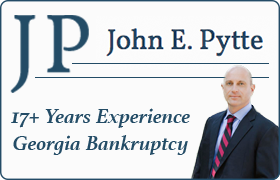Savannah Credit & Debt Lawyer, Georgia
Sponsored Law Firm
-
 x
x

Click For More Info:
-
John E. Pytte
617 Stevenson Ave Suite 102 Savannah, GA 31405 » view mapChapter 13, Chapter 7, Foreclosure Your Georgia Debt Relief Specialist
Bankruptcy has lost much of its once onerous meaning. The perception has changed largely because of the experience of thousands of people.
800-948-3470  John E. Pytte Savannah, GA
John E. Pytte Savannah, GAAttorney At Law - GA, 1995
University of Georgia School of Law
 Rebuild Credit
Rebuild CreditMost people choose to keep their personal property and just include the loan in their Chapter 13 plan.
Carol Bacon Miller
Real Estate, Estate, Child Custody, Credit & Debt
Status: In Good Standing Licensed: 33 Years
Drew Keith Stutzman
Landlord-Tenant, Litigation, Divorce, Credit & Debt, Bankruptcy
Status: In Good Standing
John Langdon Vaught
Immigration, Consumer Protection, Credit & Debt, Personal Injury, Accident & Injury
Status: In Good Standing
Wendy Anne Owens
Real Estate, Dispute Resolution, Credit & Debt, Bankruptcy
Status: In Good Standing Licensed: 26 Years
Stephen H. Harris
Federal Trial Practice, Family Law, Insurance, Credit & Debt
Status: In Good Standing Licensed: 53 Years


 John E. Pytte Savannah, GA
John E. Pytte Savannah, GA Rebuild Credit
Rebuild Credit
